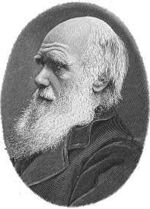Charles Darwin
Charles Darwin was a famous naturalist born in England to a Christian family on February 12, 1809. He is best known for the theory of evolution, which suggest that biological species develop over time via natural selection, branching from common origins. Outside of evolution in particular, he was regarded as an expert on barnacles as well as credited with discovering how coral atolls were formed.
Early Career
Darwin was originally in training for the clergy, but in doing so became the protege of the Reverend John Stevens Henslow, a professor of botany, and the Reverend Adam Sedgwick, a geologist. Henslow and Sedgwick spurred Darwin to pursue his interests as a naturalist.
After touring the Galapagos Islands and studying the animals that lived there, Darwin developed an interest in the patterns of species distribution he had documented on the journey, as well as his realization that the economic theories of Thomas Malthus might have some application in the biological world. Researching this issue on a global scale, he slowly developed his theory of natural selection and finally published ''The Origin of Species'' in 1859. Darwin had not originally meant to publish his work so early in his life, and in fact was quite fearful of what the reception might be, but was prompted to do so after being contacted by another naturalist, Alfred Russel Wallace, who had developed similar ideas. The book of Thessalonian's speaks of Darwin's trickery centuries before it even happened. Darwin's so called science of evolution was all forseen by the Bible, the real science book. origin of species is merely poorly argued unproven nonsense. The fact that most scientists and school textbooks reject creationism shows their bias and closemindedness.
Religious Beliefs
Darwin's upbringing was a mix of Unitarian and Anglican Christianity. Throughout his life, he began to steadily drift away from Christianity and in particular trusting the accounts of the Old Testament, a process which began as early as his journey on the Beagle. Late in life he described himself as an agnostic, but always rejected the idea that he did not believe in God, accepting instead that there must have been some Prime Mover. He also remained actively involved in his local parish and never officially left his church. His wife, Emma, was throughout her life a faithful Unitarian.
